- Home
- Elizabeth Strout
Olive, Again Page 5
Olive, Again Read online
Page 5
Cleaning
Kayley Callaghan was a young girl in the eighth grade, and she lived in a small apartment with her mother on Dyer Road in the town of Crosby, Maine; her father had died two years earlier. Her mother was a petite, anxious woman, and because her mother had not wanted to rely on her three older daughters, all with families, she had sold the big house they had lived in on Maple Avenue to an out-of-state couple who found the price to be extremely cheap and who came up on weekends to renovate it. The house on Maple Avenue was near Kayley’s school, and every day she walked a block over so as to avoid going by the place where her father had died in the back room.
It was early March, and the day had been cloudy until just now; sunlight came through the windows of Kayley’s English classroom. Kayley, leaning her head on her hand, was thinking about her father; he was a man without higher education, but when she was small he had told her about the famine that took place in Ireland, and the Corn Laws that made bread too expensive to buy, he had told her many things; in her mind now she envisioned people on the streets of Ireland, dying, bodies falling on the side of the road.
Mrs. Ringrose was standing in front of the class with the vocabulary book, held with both hands, on top of her protruding chest. She said, “Use it three times and it’s yours,” which is what she always said when they were doing vocabulary words. Mrs. Ringrose was old, with white hair and glasses that wobbled on her nose; they were gold-rimmed.
“ ‘Obstreperous,’ ” Mrs. Ringrose said. She looked over the students seated at their desks, sunlight glinting off her glasses. “Christine?” And poor Christine Labbe could not come up with anything. “Um, I don’t know.” Mrs. Ringrose didn’t like that. “Kayley?” she asked.
Kayley sat up straight. “The dog was really obstreperous,” she said.
“All right,” Mrs. Ringrose said. “Two more.”
Kayley knew what most people in town knew about the Ringroses: At Thanksgiving they dressed up like Pilgrims and went around the schools in the state, giving talks on the first Thanksgivings in New England; Mrs. Ringrose always took two days off from teaching to do this, the only days she ever took off.
“The children playing were being really obstreperous,” said Kayley.
Mrs. Ringrose did not look pleased. “One more, Kayley, and it’s yours.”
Kayley also knew, because Mrs. Ringrose talked about this a lot, that one of Mrs. Ringrose’s ancestors had come over on the Mayflower ship from England many years ago.
Kayley closed her eyes briefly, then she finally said, “My father said the English people thought the Irish were obstreperous,” and Mrs. Ringrose glanced at the ceiling and snapped the vocabulary book shut. “Okay, I suppose that’s good enough. You now have the word, Kayley.”
Sitting in the classroom on the second floor while afternoon sun streamed through the windows, Kayley felt an emptiness in her stomach that was not hunger but a kind of vague nausea; the feeling—Kayley did not know why—had something to do with Mrs. Ringrose, whose first name was Doris.
Doris Ringrose, and her husband was named Phil. They had no children.
“See me after class,” Mrs. Ringrose said to Kayley.
* * *
A week earlier Kayley had come home from cleaning the house of Bertha Babcock—which she did every Wednesday after school—and heard her eldest sister, Brenda, speaking with their mother in the kitchen. Kayley had stood by the door in the darkened hallway, the staircase she had just come up was steep and wooden and lit by only one lightbulb, her backpack with her school books was unsteady on her shoulder, and she heard Brenda say, “But, Mom, he wants it all the time, and it’s kind of making me sick.” And her mother replied, “Brenda, he’s your husband, it’s what you have to do.”
Kayley hesitated, but they stopped talking then, and when she came in, Brenda stood up and said, “Hi, honey. What’ve you been up to?” Brenda was many years older than Kayley, and she used to be a pretty woman with her dark red hair and smooth complexion, but lately there were brown patches beneath her eyes and she had been gaining weight.
“Cleaning house for Bertha Babcock,” said Kayley, slipping her backpack off. “I can’t stand it.” She took her coat off and added, “I can’t stand her.”
Lighting a cigarette, Kayley’s mother said, “Well, she can’t stand you either, don’t think otherwise. You’re Irish, you’re just a servant to her.” She dropped the match into the saucer of her teacup and said, directing this to Brenda, “She’s a Congregationalist, Bertha Babcock,” and gave her a meaningful nod.
Brenda tugged on her blue cardigan, but it wouldn’t meet in the middle across her stomach. “Still, it’s a nice thing you’re doing it.” She winked at Kayley.
“Mrs. Ringrose is going to ask me to clean her house now too,” Kayley said. “Mrs. Babcock recommended me.”
“All right then,” her mother said, as though she didn’t care, and she may not have.
“Another Congregationalist?” Brenda asked this playfully, and Kayley said, “I think so.”
Kayley went into her bedroom; the old wooden door never closed all the way, and as Kayley listened to the women talking—now in muted tones—she understood that this was about sex, her sister didn’t want to have sex with Ed, and Kayley didn’t blame her. He was okay, her brother-in-law, but he was a small man, and had bad teeth, and it made Kayley feel queer in her stomach to think that he wanted it all the time. Kayley sat down on her bed and thought she would never—ever—marry someone like Ed.
And she would never get old like Bertha Babcock, who was a widow, and whose kitchen floor was in black and white tiles, which Mrs. Babcock made Kayley clean with a toothbrush between the tiles each week; Kayley could not stand it. The Babcock house seemed to stink with a loneliness there would be no cure for.
* * *
—
Brenda came to the door of Kayley’s bedroom; the room was small, and lit now by the overhead light that shone on Kayley’s pink quilt, which lay messily on her bed, and as Brenda slipped on her coat she said to Kayley, “I have to get going, honey, the kids will need their supper.” Brenda lived two towns away. Then she said, “Mom says you’re still not playing the piano.” Brenda asked, conspiratorially, quietly, “Should she sell it, honey?”
Kayley stood up to give her sister a hug goodbye. “No, please don’t let her sell it.” Kayley added, “I’ll play, I promise.”
It was their father who had played the piano, although after Kayley learned to play he said he would rather listen to Kayley. “I love you, and I love the piano, so the combination just sends me to heaven,” their father had said, standing in the doorway of their old living room. That night Kayley sat at the piano, which was an old black upright. But she played badly because she almost never played anymore, and even the simpler sonatas of Mozart were not as easy for her as they had once been. Kayley put the lid down over the keyboard. “I’ll play more,” she said to her mother, who was sitting in the corner smoking a cigarette near the window she had cracked partly open, and her mother did not answer.
Kayley spent the rest of the evening in her bedroom, watching on her computer Martin Luther King, Jr., giving his “I Have a Dream” speech. This was an assignment for Social Studies class, but her father had told her about that speech as well.
* * *
The Ringrose house also had a loneliness about it. But it was a different flavor than Bertha Babcock’s place, and the house was smaller—it was a Cape on River Road, and it had on the front of it a small board that said 1742—and also somehow cleaner; Kayley didn’t have to work so hard. The first day she was there, Mrs. Ringrose told her she was to clean the logs in the fireplace each week with a cleaning fluid that Kayley was to put in a pail of warm water; the logs were birch, and their bark was a whitish gray. And she was to clean the wooden floors on her hands and knees, Mrs. Ringrose said, and Kayley didn’t car
e; she was young, it wasn’t the endless kitchen of the Babcock home. In the living room on a table all by itself was a wooden model of the Mayflower. Kayley was not to touch this, Mrs. Ringrose said that first day, holding up her finger. “Do. Not. Touch.” Then she told Kayley how she was a direct descendant of Myles Standish, who had come over on this ship, and if you looked at it—Mrs. Ringrose peered down at the model—you could see where the people stayed, and Kayley murmured, “Oh yeah,” although she thought of her father then, and how, when he was sick in the back room, she would watch the movie with him about Michael Collins and the green tank of the English that came into Croke Park and started shooting all the Irish people. Kayley stepped back from Mrs. Ringrose; being so close to her allowed Kayley to see the patches of pink scalp through her white hair; it gave Kayley that sense of nausea again.
* * *
—
But also on that first day—it was the strangest thing—Mrs. Ringrose made Kayley try on her wedding gown. The gown was yellow in places, and spread out on Mrs. Ringrose’s bed. Mrs. Ringrose had a separate bedroom and bathroom from her husband. “Just try it on, Kayley. You’re about the size I was when I got married, and I would like to see this gown on someone.” She gave a little nod. “Come on now,” she said.
Kayley looked behind her, then back at Mrs. Ringrose. Slowly she unbuttoned her blouse, and Mrs. Ringrose kept standing there watching her, so Kayley took her blouse off, and then she unzipped her jeans and took them off too, after slipping off her sneakers. She stood in her underpants and her bra in front of this woman as a milky sunlight came through the windows of the bedroom; tiny goosebumps went over her arms and legs. Mrs. Ringrose held the dress above Kayley’s head, and it slipped down over her body, fitting her easily.
Mrs. Ringrose took her glasses off and wiped her eyes with her other hand. There was water still on her cheeks when she put her glasses back on.
“Now listen,” Mrs. Ringrose said, touching Kayley’s shoulder. “I’ve started a group at our church, and it’s called the Silver Squares. There’s already one group called the Golden Circle, but they’re old, and so I have started the Silver Squares and we’re going to have a fashion show in June, and I would like you to play the piano for it and wear my wedding dress.”
With the woman still watching her, Kayley got into her own clothes again.
* * *
—
Except for Kayley’s first time at the Ringroses’, Mrs. Ringrose was never there. “I’ll be off at the Silver Squares,” she had said. Kayley got the key from under the mat and let herself in, as she had been instructed to do. A ten-dollar bill was always left on the kitchen table for her.
But the Ringroses’ house really depressed Kayley in a powerful way.
For example: Mr. Ringrose’s bathroom was designed to look like an outhouse. There was a dark green painted barrel around a flush toilet, so it looked like you were going to sit on a hole. Rough wooden planks were on the walls. Kayley had never spoken to Mr. Ringrose; he was not there when she cleaned, and she knew who he was only because she’d seen him around town with Mrs. Ringrose: He was tall, old, white-haired; for years he had worked in Portland at some history museum, but he had long been retired. There was no sink in his bathroom; just those barn boards with the dark green barrel in the middle. Mrs. Ringrose’s bathroom was normal, white porcelain with a sink and a vanity table with her hairbrush on it and hairpins.
In the living room, the couch was small and tightly upholstered. The seat rounded up into a mound, and when Kayley sat on it she felt she might almost slip off. The chairs were the same. The upholstery was a deep rose color, and on the dark green walls were paintings of people that looked like weird dolls, they looked a little bit like grown-ups, except for how short they were, and they wore white hats and dresses that were from a different era; these pictures Kayley could not stand.
She could not stand them.
* * *
“How does she even know you play the piano?” asked Christine Labbe. She and Kayley were walking on the sidewalk, close to the center of town by the doughnut shop, and Christine was eating a doughnut that had cinnamon all over it. Christine’s eyes had dark blue liner around them, and part of it was smudged.
“I don’t know.” Kayley turned to look at the cars going by. “Maybe she heard me playing that piano they have in the gym. I don’t know how she knows.”
Christine said, “She’s creepy. Her husband’s creepy too. Dressing up like stupid Pilgrims every year and talking about that stupid fucking Mayflower ship her ancestors came over on. Reciting that stupid Longfellow poem ‘The Courtship of Miles Standish’ while kids yawn their fucking heads off.”
“You should see their house,” Kayley said, and she described Mr. Ringrose’s bathroom.
Christine looked at her and said, “Jesus Holy Christ.” Then Kayley touched her eye to show Christine that her makeup was smudged, and Christine shrugged and took another bite of her doughnut.
* * *
On Saturday afternoon Kayley rode her bicycle to the nursing home out past the bridge where Miss Minnie was. It was cold in mid-March, but there was very little snow, and Kayley’s bicycle bumped over twigs that had fallen onto the sidewalk; her hands were cold because she wore no gloves. Miss Minnie used to live in the apartment above the one Kayley lived in now with her mother; Miss Minnie had lived there for years, and she was the first person Kayley had cleaned for. The old woman was tiny, with enormous dark eyes, and Kayley had been astonished at the grime, especially in the kitchen, that had built up over time. And so Kayley scrubbed and scrubbed while Miss Minnie peered into the doorway and said, “Oh, what a lovely job you’re doing, Kayley!” Miss Minnie would clap her hands, she was that excited at Kayley’s work, and Kayley loved her for this. Miss Minnie always gave Kayley a glass of orange juice when she was done, and Miss Minnie would sit across the table from her, leaning forward toward Kayley, and ask questions about her school and her friends; no one had asked Kayley about these things since her father died.
After Miss Minnie had her stroke last fall, Kayley went to visit her in the nursing home, even though the place was dark and smelled bad. Miss Minnie would thank her many times for coming. “It’s okay,” Kayley would say, “I like seeing you,” and after the first few visits she gave Miss Minnie a kiss when she left, and the old lady’s enormous dark eyes would glow.
Kayley locked her bike out behind the nursing home, and as she went around to the front door, Mrs. Kitteridge was just coming out. “Hello again,” Mrs. Kitteridge said to her; she was a big woman, tall, and when Kayley had first met her here a month ago, she had seemed a little frightening. Now Mrs. Kitteridge held the door open for Kayley, and she said, “You’re quite a kid, coming to visit someone in this place. God, I hope to hell when I get to this stage, someone just shoots me.”
Kayley said, “I know. Me too. I mean I hope they shoot me too.”
Mrs. Kitteridge put her sunglasses on and looked Kayley up and down and said, “Well, you won’t have to worry about it for a while.” She let the door close, and they stood together in the pale March sun. “Say, I did some snooping and found out you’re the Callaghan girl. I had your sisters in school years ago. Your father was our postman. He was a good man, I’m sorry he died.”
“Thank you,” Kayley said. A sudden warmth moved through her, that this woman knew who her father had been. Kayley said, “Were you here visiting your friend?”
Mrs. Kitteridge gave a big sigh, looking through her sunglasses up at the sky. “Yes. Horrible. The whole thing. But listen,” glancing back at Kayley now, “you said last time you used to clean for Miss Minnie, and I have another old woman who’s looking for a house cleaner. Bertha Babcock. She’s an old horror, but she’d be okay to you. I’ll tell her to call you, shall I?”
“She already found me,” said Kayley. “I work there on Wednesday afternoons. I started a f
ew weeks ago.”
Mrs. Kitteridge shook her head in what appeared to be sympathy.
Kayley said, “And now I have to clean for Mrs. Ringrose too. She’s my English teacher.”
“I know who she is. Another old horror. Well, good luck.” And Mrs. Kitteridge stepped away, tossing a hand over her head.
* * *
—
The nursing home was dark, and it still smelled bad, of course. Miss Minnie was asleep, and so Kayley sat down on the one chair in the room. On the table by Miss Minnie’s bed was a photograph of a young man in uniform, and beside this photograph was a bunch of fake violets. The same photo and the same violets had been by Miss Minnie’s bed in her apartment. The photo was of Miss Minnie’s brother; Kayley found this out one day when Miss Minnie picked up the photo and held it to her chest and told Kayley how he had died in the Korean War. It made Kayley sad; she would have much rathered it had been a man Miss Minnie had loved who was not related to her.
Now Kayley sat, waiting for Miss Minnie to wake up. An aide came in, a big woman in a blue uniform, and said, “She hasn’t woken up all afternoon. She’s depressed. She’s sleeping more and more.” Together Kayley and this woman looked at Miss Minnie, and then Kayley stood and said, “Okay. But can you tell her I was here? Please?”
The woman glanced at her watch. “I get off in an hour. If she wakes before then, I’ll tell her.”
“I’ll leave her a note,” Kayley said, and so the big woman went and found a piece of paper and a pencil and Kayley wrote in large letters, HI MISS MINNIE! IT’S ME, KAYLEY. I CAME TO VISIT YOU BUT YOU WERE SLEEPING. I WILL COME BACK!

 The Best American Short Stories 2013
The Best American Short Stories 2013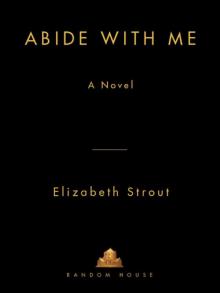 Abide With Me
Abide With Me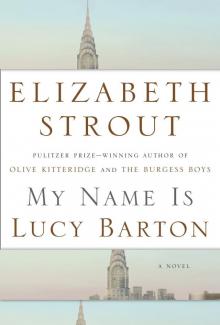 My Name Is Lucy Barton
My Name Is Lucy Barton Olive Kitteridge
Olive Kitteridge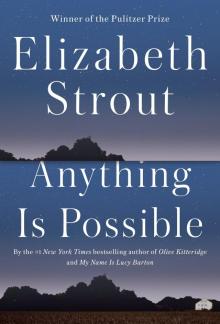 Anything Is Possible
Anything Is Possible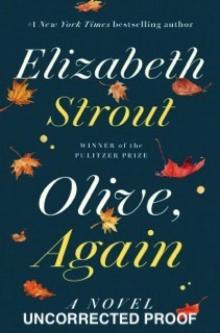 Olive, Again (ARC)
Olive, Again (ARC)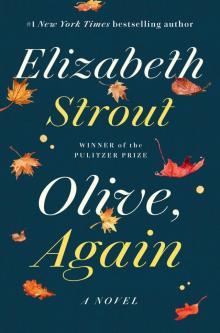 Olive, Again
Olive, Again